Back to NewsNext People's University Livestream Series: The Struggle for Women's Rights
Posted 08/07/20
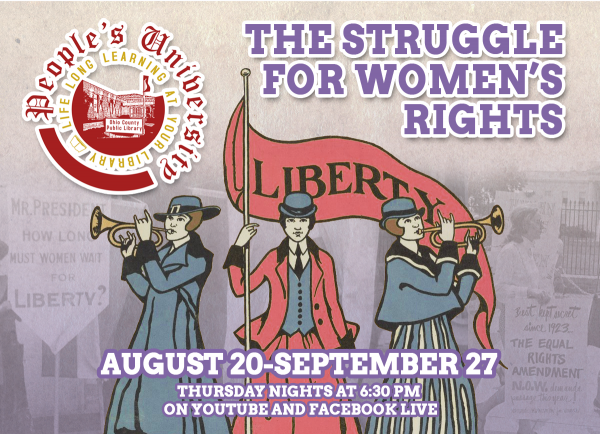
People's University "Around the World in Literature and Language" may have just wrapped up, but we already have a new series planned for you. Just in time to celebrate the 100th anniversary of the ratification of the 19th Amendment which prohibits the states and the federal government from denying the right to vote to citizens of the United States on the basis of sex (ratified August 18, 1920), we will launch the 30th installment in our People's University Series: "The Struggle for Women's Rights."
A look back at history shows that women have made great strides in the fight for equality, including women’s suffrage and inroads in equal opportunity in the workplace and education. Despite the tremendous progress made in the struggle for equality, women still face barriers to equal participation in society. In this six-class series, we will take a broad look back at the history of women's rights. We'll learn about powerful women of the past and the roles some of our founding mothers played in our own country's development, explore the suffrage movement on a local and national scale, and finally take a look at current legislation and issues women still deal with today.
People's University: "The Struggle for Women's Rights" will be broadcast live online, Thursday nights from 6:30 pm to 8 pm on YouTube Live and Facebook Live starting August 20th and running through September 27th. View the full schedule and class details below.
|
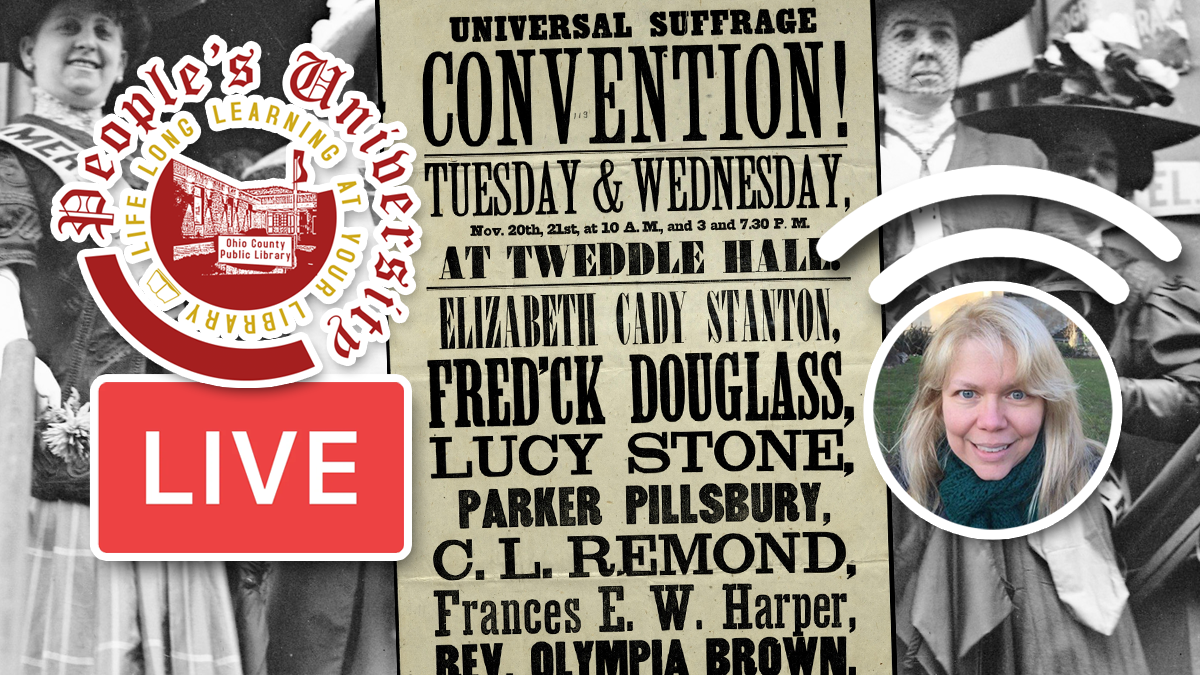
|
CLASS 1 - August 20 at 6:30 pm:
The Ratification of the 19th Amendment - 100 Years
The first wave of American feminism before the Civil War culminated in the July 19 and 20 convention at Seneca Falls, NY, where 68 women (including Lucretia Mott) and 32 men (including abolitionist Frederick Douglass) signed the "Declaration of Sentiments" drafted by Elizabeth Cady Stanton, which said that "All men And Women are created equal." At the convention, suffragists and abolitionists spoke out for human rights and equality. In the years that followed, suffragists like Susan B. Anthony, Alice Paul, Lucy Stone, and Ida B. Wells carried on the long struggle until the 19th Amendment, which finally recognized the right of women to vote, was ratified on August 18, 1920.
 INSTRUCTOR: Anne Marie Lofaso is Arthur B. Hodges Professor of Law at the West Virginia University College of Law. In 2010, she was named WVU College of Law Professor of the Year. She is also a four-time recipient of the WVU College of Law faculty-scholarship award. INSTRUCTOR: Anne Marie Lofaso is Arthur B. Hodges Professor of Law at the West Virginia University College of Law. In 2010, she was named WVU College of Law Professor of the Year. She is also a four-time recipient of the WVU College of Law faculty-scholarship award.
|
WIN THIS PUZZLE!
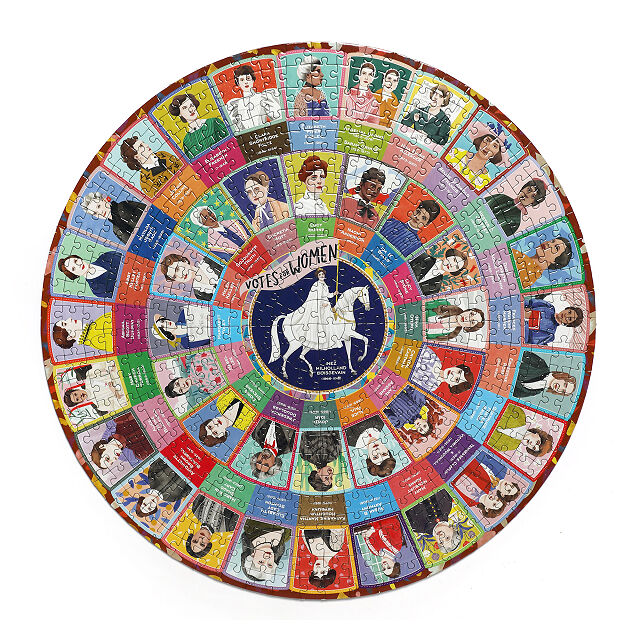
NOTE: All attendees who ask a relevant question of our instructor toward the end of the program will be entered in a drawing to win a beautifully illustrated "Votes for Women Puzzle" (500 pieces) created by Monica Garwood.
|
|
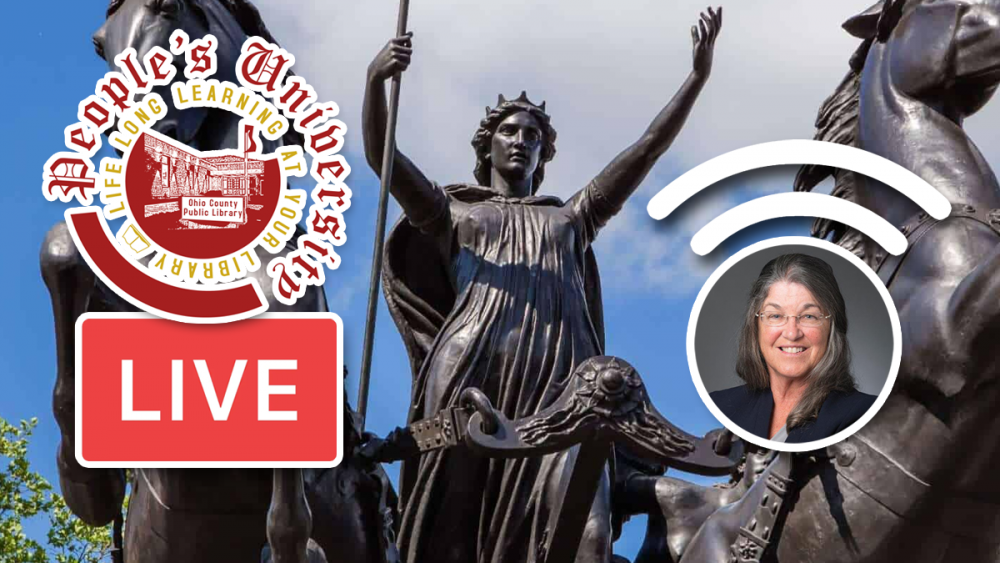
|
CLASS 2 - August 27 at 6:30 pm:
Powerful Women in History: How did they rise to the top?
There have always been women in the ancient past who transcended gender expectations and rose to dominate the headlines of history. How did they do it? Some were born to power and exerted it brilliantly like Empress Wu of China or Sorkhaktani, Queen of the Mongols. Others were angry and fought back, sometimes on the battlefield, like Boudicca of Britain and sometimes politically like Empress Pulcheria of Byzantium. Some women found authority in religion from monastic founders like Radegund of France to religious warriors like Joan of Arc. Finally, some women are remembered for their intellectual achievements like Hypatia of Alexandria or Lady Murasake of Japan. There are many paths to fame, and ancient women proudly walked them. In today’s lecture you will meet some of these powerful women and hear their stories.
 INSTRUCTOR: Joyce E. Salisbury who is Professor Emerita of History from the University of Wisconsin – Green Bay. She is author of many books and most recently has written and recorded courses for Great Courses and Audible, including “Warriors, Queens, and Intellectuals: 36 Great Women before 1400” and “Ten Women Who Ruled the Renaissance.” INSTRUCTOR: Joyce E. Salisbury who is Professor Emerita of History from the University of Wisconsin – Green Bay. She is author of many books and most recently has written and recorded courses for Great Courses and Audible, including “Warriors, Queens, and Intellectuals: 36 Great Women before 1400” and “Ten Women Who Ruled the Renaissance.”
|
WIN THESE WINE GLASSES!

NOTE: All attendees who ask a relevant question of our instructor toward the end of the program will be entered in a drawing to win two (2) "Historic Women Who Dared" stemless wine glasses.*
Toast to women who dared to challenge social norms and push for progress, including Marie Curie & Susan B. Anthony!
*Note: Wine not included.
|
Week 3 - Class 3, September 3, 2020:
Founding Mothers
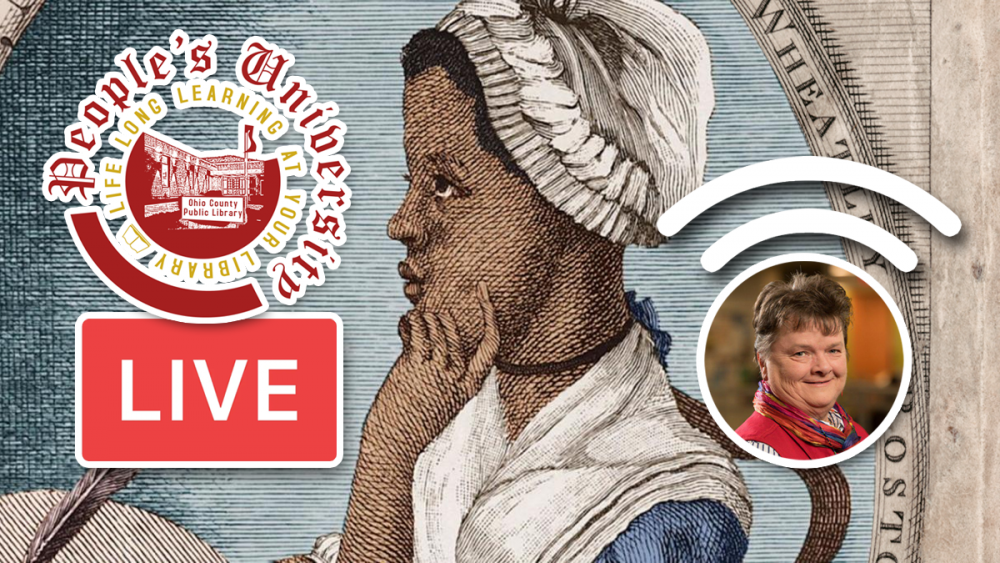
|
CLASS 3 - September 3 at 6:30 pm:
Founding Mothers
From Abigail Adams, who famously instructed her husband to "Remember the ladies," to Phillis Wheatley, an ex-slave who became the first African American and second woman (after Anne Bradstreet) to publish a book of poems; Deborah Sampson; Mercy Otis Warren; Esther Reed, and others, we will explore the lives and actions of the women leaders of the founding period of the United States of America.
 INSTRUCTOR: Jerra Jenrette is Professor of History, Department of History, Politics, Languages, and Cultures at Edinboro University of Pennsylvania. She earned her B.A. from Mars Hill College, M.A. from Appalachian State University, and her Ph.D. from West Virginia University. A veteran People's U. instructor, Dr. Jenrette previously joined us to lead PEOPLE'S UNIVERSITY: WWII - Class 5, "On the Home Front and Abroad: Women in WWII" in 2018. INSTRUCTOR: Jerra Jenrette is Professor of History, Department of History, Politics, Languages, and Cultures at Edinboro University of Pennsylvania. She earned her B.A. from Mars Hill College, M.A. from Appalachian State University, and her Ph.D. from West Virginia University. A veteran People's U. instructor, Dr. Jenrette previously joined us to lead PEOPLE'S UNIVERSITY: WWII - Class 5, "On the Home Front and Abroad: Women in WWII" in 2018.
|
ANOTHER CHANCE TO WIN WINE GLASSES!

NOTE: All attendees who ask a relevant question of our instructor toward the end of the program will be entered in a drawing to win two (2) "Historic Women Who Dared" stemless wine glasses.*
*Note: Wine not included.
|
|
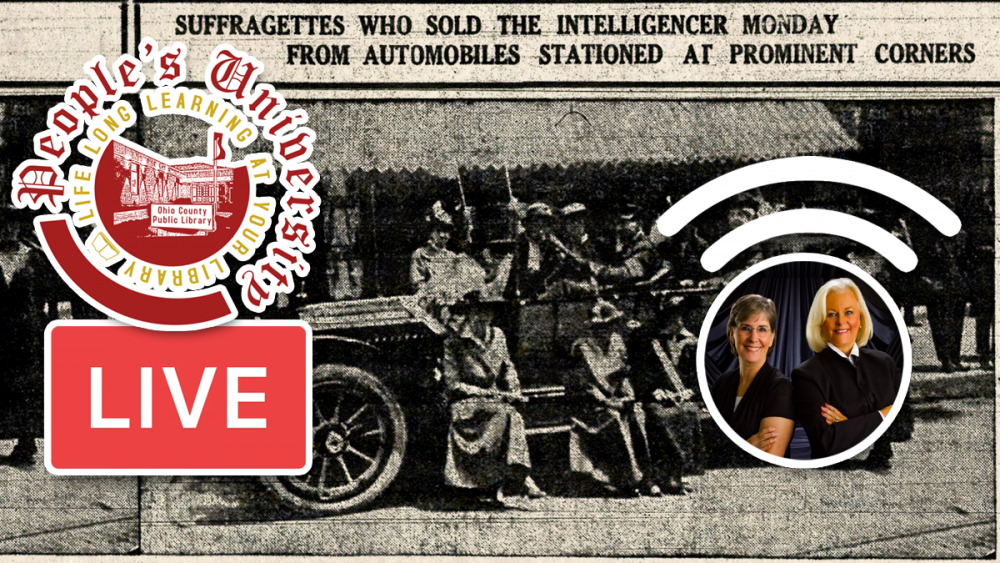
|
CLASS 4 - September 10 at 6:30 pm:
Wheeling's Suffragists
On November 14, 1896, the Women's Suffrage Movement in Wheeling was for the first time formally organized in the home of Dr. Harriet B. Jones as the Political Equality League. Dr. Jones was elected president, Miss Jennie B. Wilson, corresponding secretary, and Mrs. George K. Wheat treasurer. Among the Charter members were Mrs. Ada Barr, Mrs. W. T. Burt, Mrs. Elliott, Mrs. Henry Ott, Miss Sue Rice, and Miss Lizzie Swift.
1916 article: "Among the prominent suffragists who 'manned' the automobiles were: Mesdames George A. Laughlin, Robert Hazlett, Gibson Caldwell, W. D. McCoy and E. S. Romine, and Misses Elizabeth Cummins, Mary Clifford, Ruth Mason, Gladys Dexter, Anne Cummins and Florence Hoge. . ."
 INSTRUCTORS: Judi Hendrickson and Jeanne Finstein are local history researchers who enjoy discovering and sharing interesting pieces of the past, particularly Wheeling history. They are the authors of a book on local history, Walking Pleasant Valley, and are long-time, active members of the historic preservation organization, Friends of Wheeling. INSTRUCTORS: Judi Hendrickson and Jeanne Finstein are local history researchers who enjoy discovering and sharing interesting pieces of the past, particularly Wheeling history. They are the authors of a book on local history, Walking Pleasant Valley, and are long-time, active members of the historic preservation organization, Friends of Wheeling.
|
WIN THIS TOILETRY BAG!
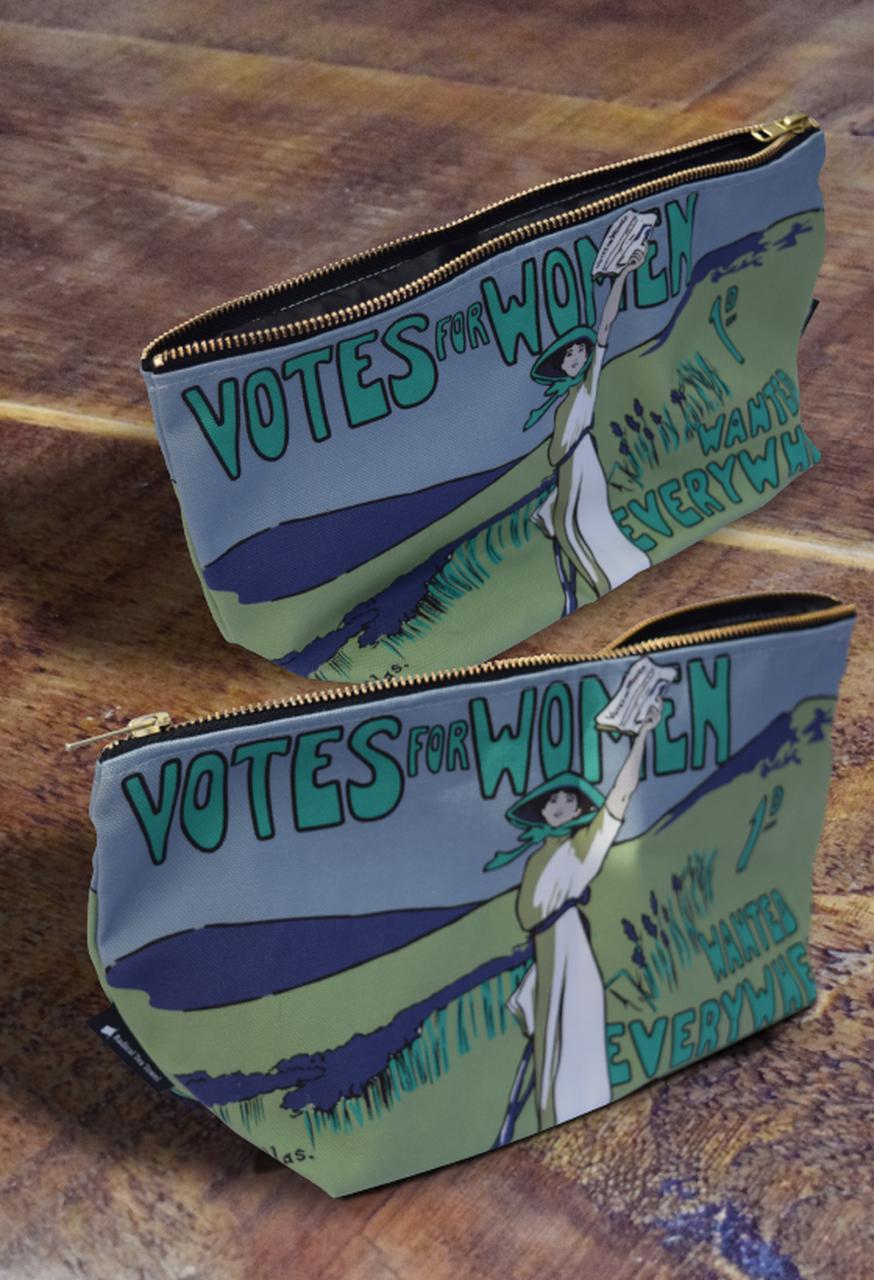
NOTE: All attendees who ask a relevant question of our instructors toward the end of the program will be entered in a drawing to win a "Votes for Women" toiletry bag from RadicalTeaTowel.com.
The art comes from a 1909 vintage poster advertising the ‘official’ suffragette paper, Votes for Women.
|
|
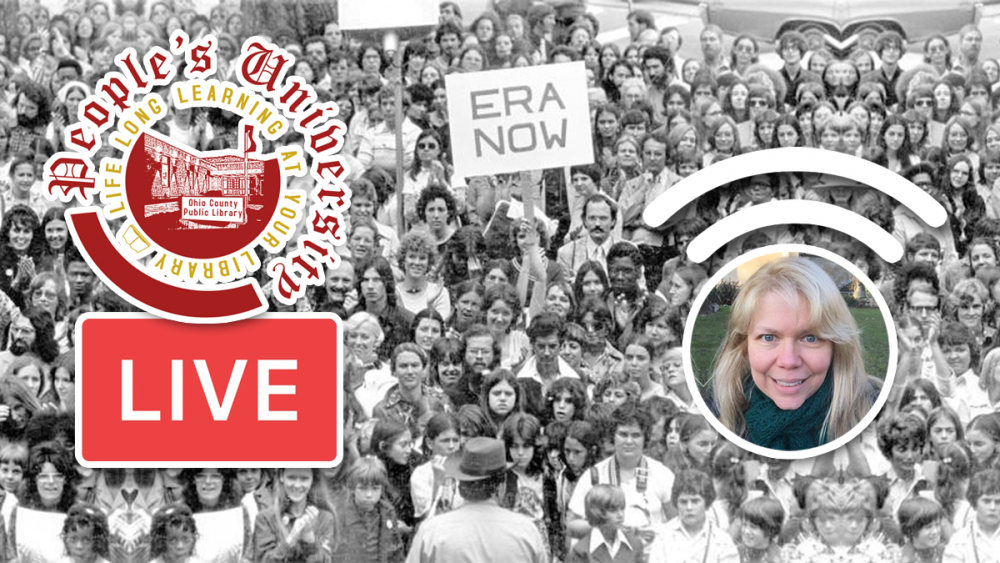
|
CLASS 5 - September 17 at 6:30 pm:
The Equal Rights Amendment
For Constitution Day, 2020, this class will examine the amendment process in the context of the struggle for the passage of the Equal Rights Amendment (ERA), which read, in its three incarnations: 1923 version ("Lucretia Mott Amendment" by Alice Paul, Crystal Eastman, et al): "Men and women shall have equal rights throughout the United States and every place subject to its jurisdiction"; 1943 version: "Section 1: Equality of rights under the law shall not be denied or abridged by the United States or by any state on account of sex." (Alice Paul); 2014 version: "Section 1: Women shall have equal rights in the United States and every place subject to its jurisdiction. Equality of rights under the law shall not be denied or abridged by the United States or by any State on account of sex."
On March 22, 1972, the ERA passed the Senate and the House of Representatives by the required two-thirds majority and was sent to the states for ratification. An original seven-year deadline was later extended by Congress to June 30, 1982. When this deadline expired, only 35 of the necessary 38 states (the constitutionally required three-fourths) had ratified the ERA. It is therefore not yet a part of the U.S. Constitution.
The Equal Rights Amendment has been reintroduced in every session of Congress since 1982.
 INSTRUCTOR: Anne Marie Lofaso is Arthur B. Hodges Professor of Law at the West Virginia University College of Law. In 2010, she was named WVU College of Law Professor of the Year. She is also a four-time recipient of the WVU College of Law faculty-scholarship award. INSTRUCTOR: Anne Marie Lofaso is Arthur B. Hodges Professor of Law at the West Virginia University College of Law. In 2010, she was named WVU College of Law Professor of the Year. She is also a four-time recipient of the WVU College of Law faculty-scholarship award.
|
WIN THIS TEA TOWEL!
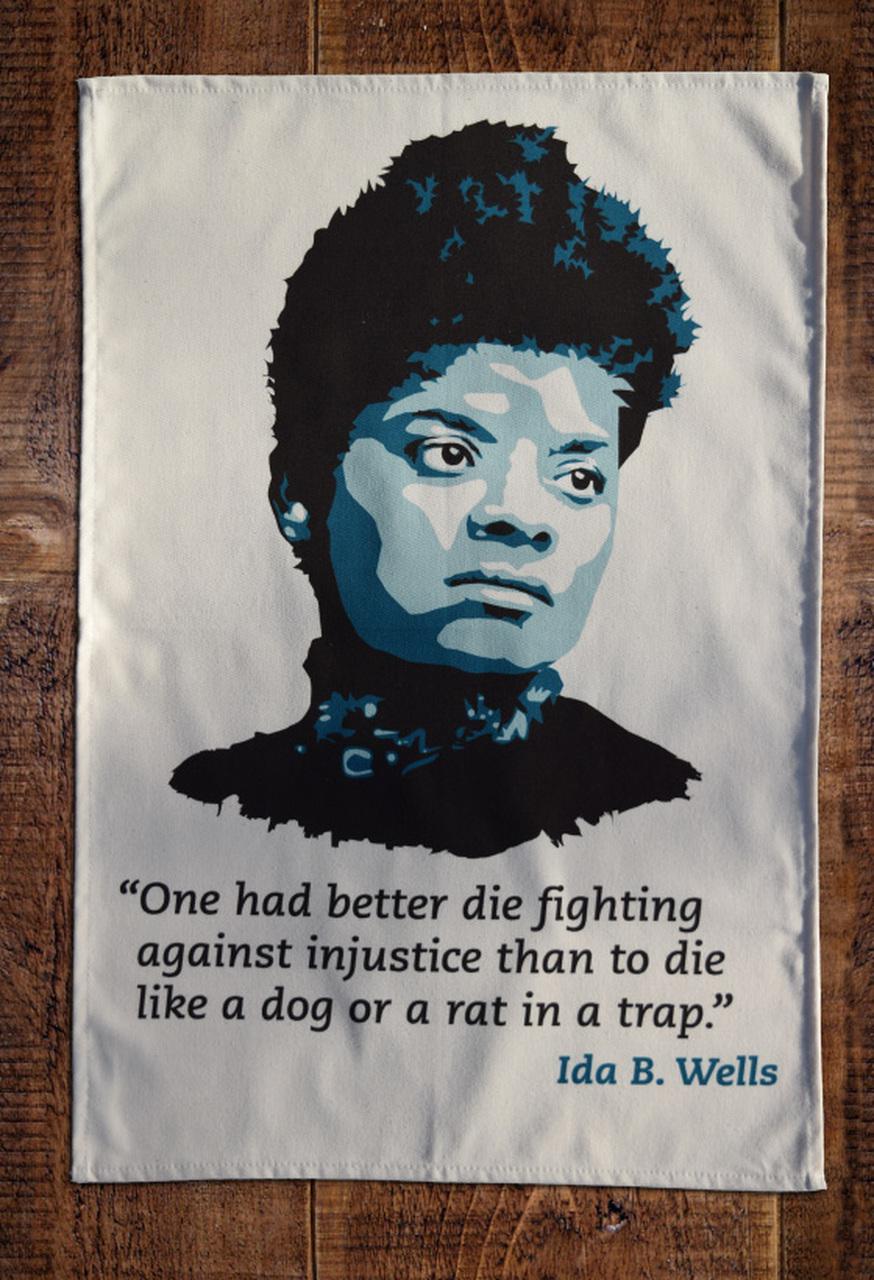
NOTE: All attendees who ask a relevant question of our instructor toward the end of the program will be entered in a drawing to win an Ida Bell Wells tea towel from RadicalTeaTowel.com.
Ida B. Wells was born a slave in Mississippi. Her family was freed from slavery shortly after her birth by the Emancipation Proclamation. On a train ride from Memphis to Nashville in 1884, for which she had bought a first-class ticket, Wells was asked to move to the car for African Americans. Her refusal to do so led her to sue the railroad, a case she won, but which was later overturned by the Tennessee Supreme Court. This was the event that marked a turning point in Wells' life that initiated her in civil rights and women’s rights activism.
|
|
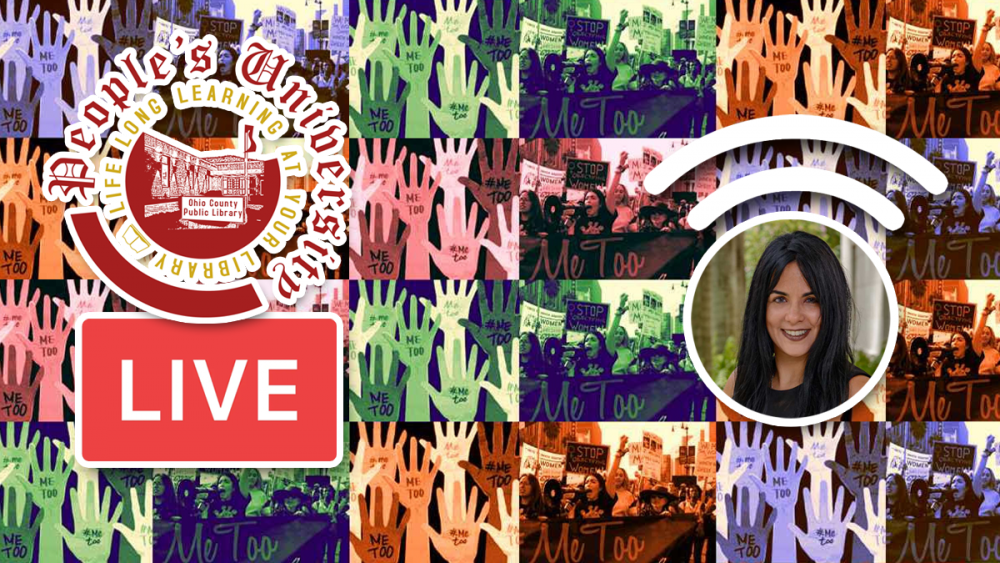
|
CLASS 6 - September 27 at 6:30 pm:
The “Me Too” Movement and Contemporary Issues
"In 2006, the 'Me Too' Movement was founded by survivor and activist Tarana Burke. In those early years, we developed our vision to bring resources, support, and pathways to healing where none existed before. And we got to work building a community of advocates determined to interrupt sexual violence wherever it happens. In 2017, the #metoo hashtag went viral and woke up the world to the magnitude of the problem of sexual violence."
This talk will explore the significance of the #metoo movement through the lens of anti-discrimination law. While the movement represented a reckoning of sorts with a widespread problem, how did we get to the point at which women, especially in the workplace, could be victimized and demeaned, often openly, with no practical recourse? This talk will focus on anti-discrimination laws and sex discrimination in the workplace, and the ways in which their shortfalls brought us to the point of needing such a dramatic reckoning.
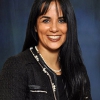 INSTRUCTOR: Kerri L. Stone Professor of Law, Florida International University, teaches Employment Discrimination, Employment Law, Labor Law, and Contracts at the FIU College of Law. After receiving a B.A. in English and Comparative Literature from Columbia University, magna cum laude, Professor Stone received her Juris Doctorate from NYU School of Law, where she was named a Robert McKay Scholar and served as the Developments Editor of the NYU Journal of International Law and Politics. INSTRUCTOR: Kerri L. Stone Professor of Law, Florida International University, teaches Employment Discrimination, Employment Law, Labor Law, and Contracts at the FIU College of Law. After receiving a B.A. in English and Comparative Literature from Columbia University, magna cum laude, Professor Stone received her Juris Doctorate from NYU School of Law, where she was named a Robert McKay Scholar and served as the Developments Editor of the NYU Journal of International Law and Politics.
|
WIN THIS TEA TOWEL!
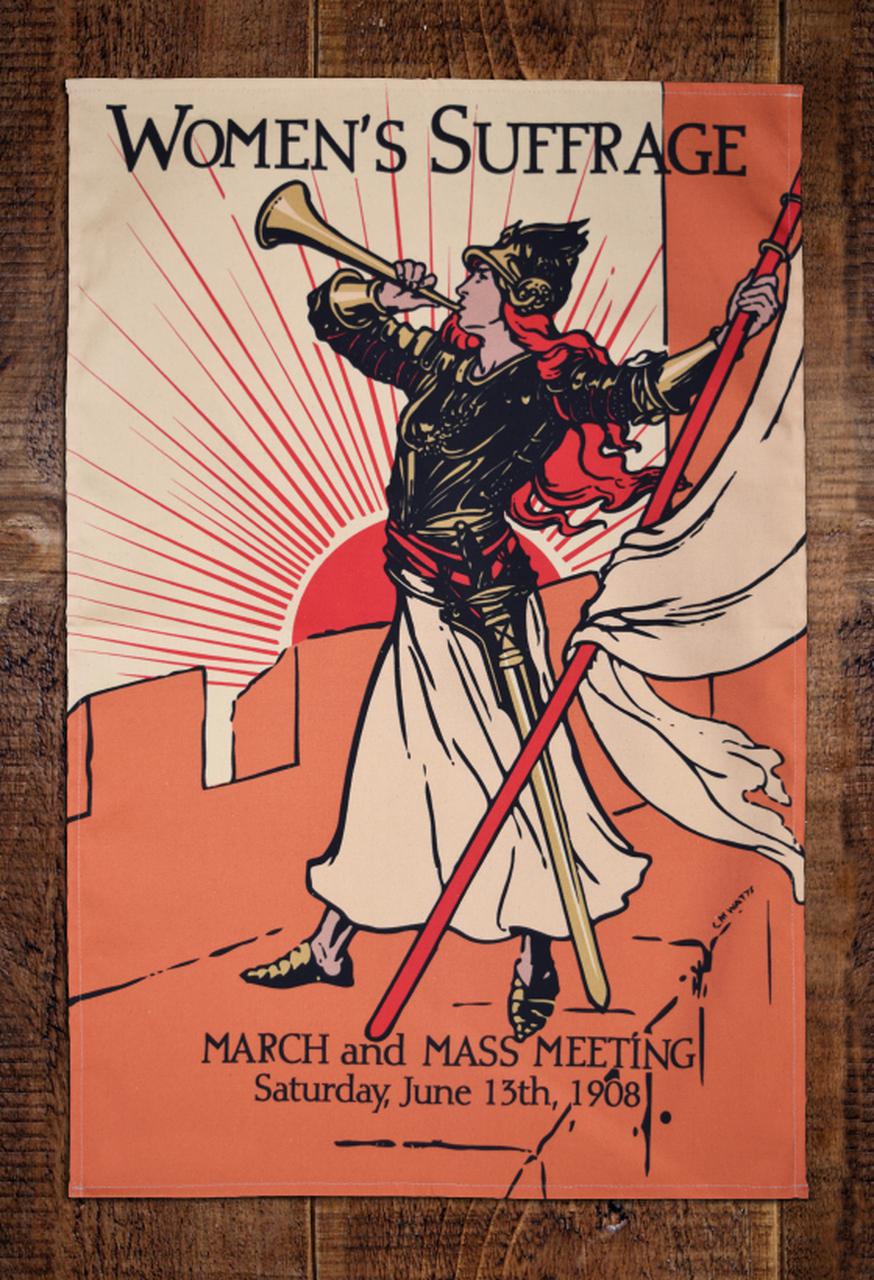
NOTE: All attendees who ask a relevant question of our instructor toward the end of the program will be entered in a drawing to win a "Women's Suffrage" tea towel from RadicalTeaTowel.com.
The striking design on this radical tea towel is taken from a vintage 1908 poster design by Caroline Marsh Watts. It features a girl marching with a bugle, an instrument historically used to relay instructions during battle. The Bugler Girl certainly trumpeted her battle message loud and clear: against injustice, for equality.
|
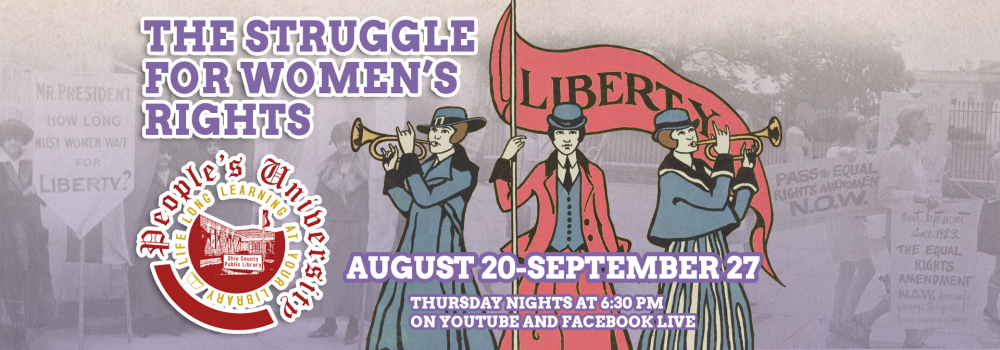
ABOUT PEOPLE'S UNIVERSITY:
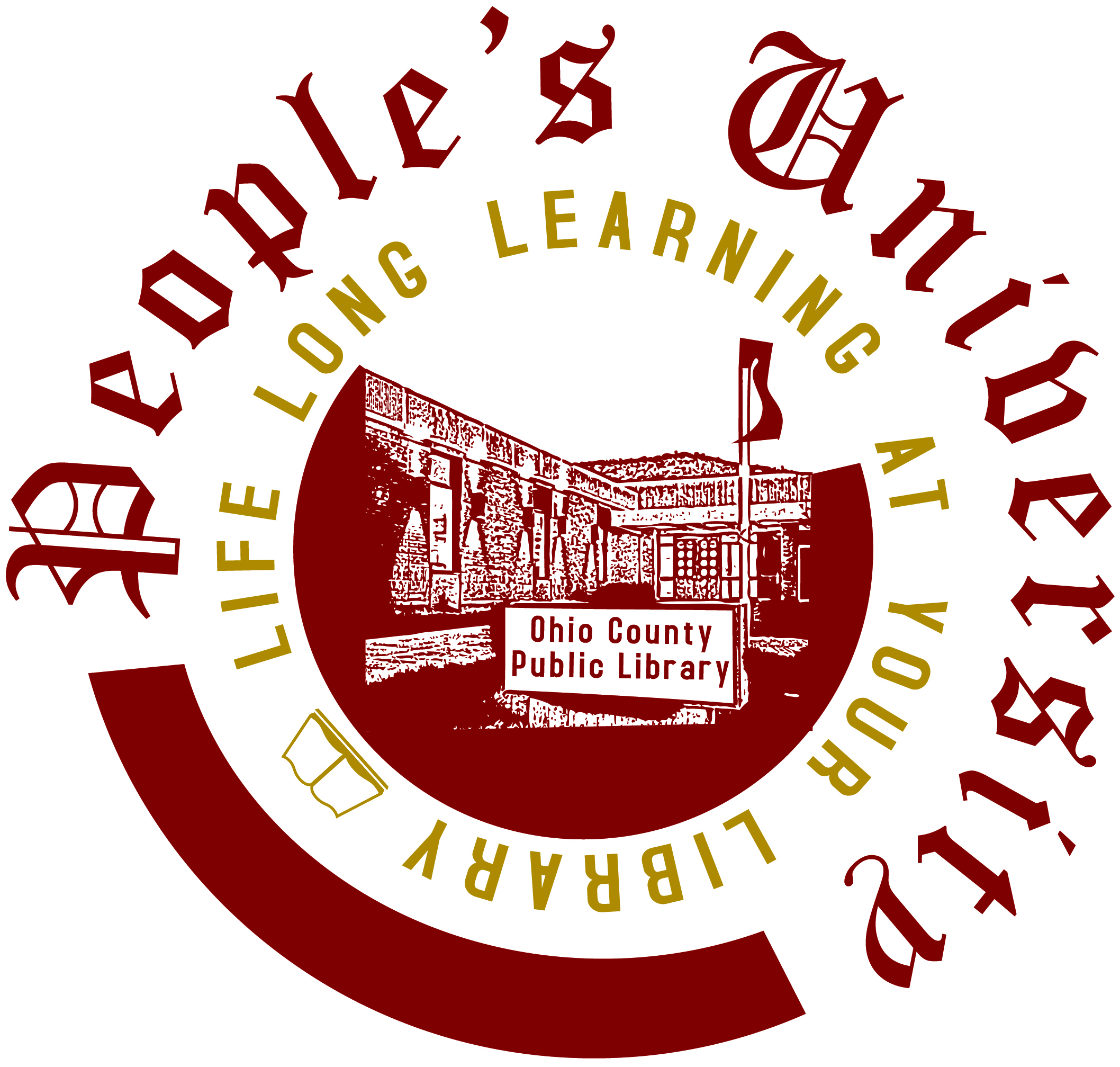
The People’s University is a free program for adults who wish to continue their education in the liberal arts, featuring courses taught by experts in each subject that enable patrons to pursue their goal of lifelong learning in subjects such as history, philosophy, and literature.
- People's University Online -
Thursdays from 6:30 pm to 8 pm on YouTube Live and Facebook Live
Log into your Facebook or YouTube account during the broadcasts to ask our presenters questions or leave comments in the comments box. Our instructors will see your questions and answer them during the broadcast.
Subscribe to the People's University Youtube channel or like us on the People's University Facebook page or to receive notifications of our upcoming People's U broadcasts.
Library-Sponsored Programs Policy
The purpose of Ohio County Public Library-sponsored programs is to provide education, information, and entertainment for library patrons. The Library reserves the right to exercise sole discretion in selecting and inviting presenters for its programs. In selecting presenters, the Library does not discriminate on account of race, color, age, sex, sexual orientation, physical or mental disability, political affiliation, religion, ancestry or national origin, and the views expressed by presenters of Library-sponsored programs, or by any person in attendance at the programs, do not necessarily reflect the views of the Library, its staff, and/or its representatives.




